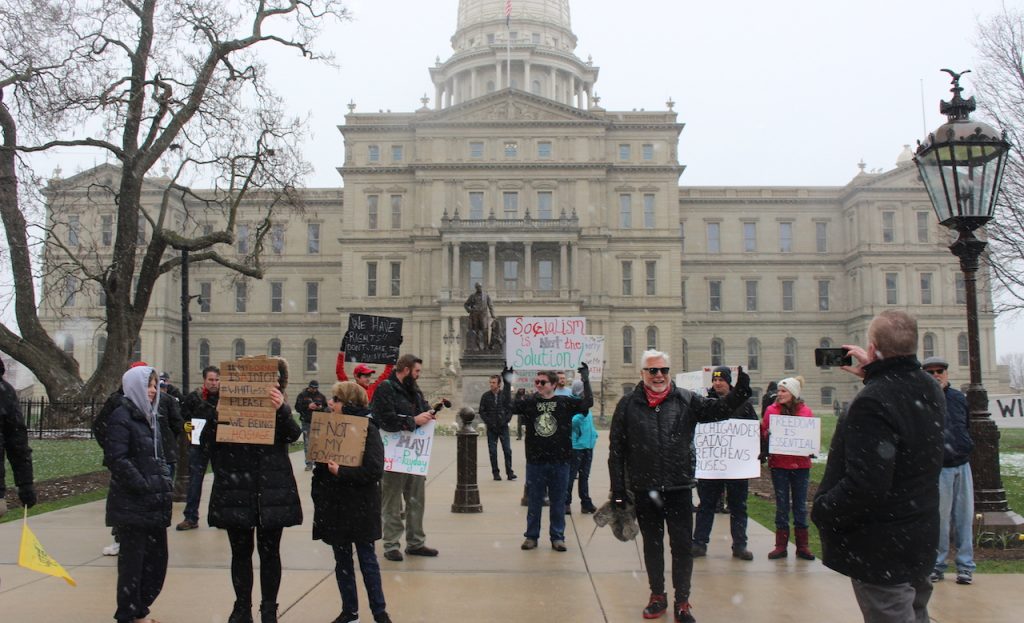After COVID-19, Our Grief Is What Will Be Remembered
The loss and pain I feel during the pandemic is a universe away from what protestors are saying about the economy and personal freedom. What explains the gulf?

There have been times in our history when it has seemed we don’t all live in the same country.
Our political and cultural divisions stretch and strain all the time, and sometimes I marvel at the idea that these states, with all different dynamics and beliefs and histories, can even call themselves a union.
But right now, I have to be honest — I’m wondering whether we all live in the same universe.
How could you know about what’s happening in places like Detroit and be more up in arms about money, or things, or your own sense of ‘freedom’?
For some of us, the coronavirus pandemic is chiefly about death and emotional loss. We know the people who are sick. We know the people who are losing their lives. And we know those who are affected by that loss.
We are terrified about the security and value of the most fundamental right of all — the right to life.
But for others, this is chiefly about the disruption caused by the pandemic. The screeching halt to the economy, the inconvenience of stay-home orders, and the financial damage this will do for years to come.
I guess I just don’t understand. Not at all.
No Escaping Grief in Detroit
Over the weekend, a young woman named Skylar Herbert, who was just five years old, became the first child in Michigan to die from a COVID-19 infection.
Five years old. The epitome of a senseless victim.
I don’t understand people who think that at the end of this, we’ll sit around and look chiefly at the financial damage
Her death showed up in my social feeds because I live here in Detroit, where she did. As much as this is a big city, it’s a pretty small town. There is no way to distance from what’s happening. Each day just brings more of it. Each day, you check your social feed to see whose sick, whose dying and whose gone.
At the same time, of course, we’ve got people protesting in state capitals, insisting that the stay-home orders — that are our only real hope to curb the virus — are a violation of their rights to buy things or sell things, or go and enjoy life the way it used to be.
I’m sorry, but how could you know about what’s happening in places like Detroit and be more up in arms about money, or things, or your own sense of “freedom”?
We Don’t Understand Each Other
The only answer I can come up with is that we just don’t know each other. We don’t live in the same way, in the same places. And we don’t understand each other.
It’s so vividly illustrated by the contrast right now.
We need to be able to talk about this without arguing. We need to be able to talk about this without coming to blows.
I don’t think I know what the answer is. I know how I feel. I know how angry I get when I think about people who want to talk about the economy, who want to talk about money, instead of talking about how we deal with the public health threat that is taking so much from us.
I don’t understand people who think that at the end of this, we’ll sit around and look chiefly at the financial damage, as opposed to wondering where all the people who are gone went. How they left us so fast. How we were unable to even acknowledge, in the public way that we do, their leaving us.
We need to be able to talk about this without arguing. We need to be able to talk about this without coming to blows. But I I really don’t understand. I really don’t understand the gulf here. I don’t get it.
I want to implore everybody, even those of us who are worried about the economy and the financial damage, to think about the loss that people are enduring right now. Think about what’s happening in people’s lives. Think about the family of a five-year-old girl who a month ago complained about a headache, and after two weeks on a ventilator, is dead.
It’s got to matter more. If we have any hope of being a people — of being a nation — that has to matter more.
This is a transcription of host Stephen Henderson’s introduction on Detroit Today, edited for length and clarity.
Trusted, accurate, up-to-date
WDET is here to keep you informed on essential information, news and resources related to COVID-19.
This is a stressful, insecure time for many. So it’s more important than ever for you, our listeners and readers, who are able to donate to keep supporting WDET’s mission. Please make a gift today.

